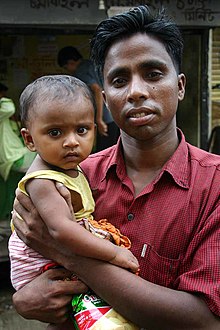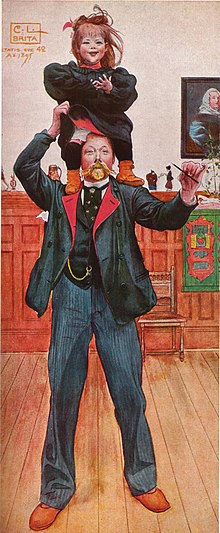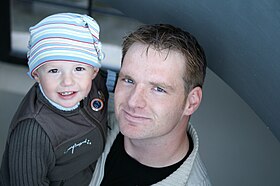My Dad Codes Better Thsn Your Dad Baby Clothes

A father is the male person parent of a child. As well the paternal bonds of a father to his children, the begetter may have a parental, legal, and social human relationship with the child that carries with information technology sure rights and obligations. An adoptive father is a male who has go the child's parent through the legal process of adoption. A biological father is the male person genetic contributor to the cosmos of the babe, through sexual intercourse or sperm donation. A biological begetter may take legal obligations to a child not raised past him, such as an obligation of budgetary support. A putative father is a human whose biological relationship to a child is declared but has non been established. A stepfather is a male who is the husband of a child'southward mother and they may form a family unit, but who generally does not have the legal rights and responsibilities of a parent in relation to the kid.
The adjective "paternal" refers to a father and comparatively to "maternal" for a female parent. The verb "to father" means to procreate or to sire a child from which also derives the noun "fathering". Biological fathers make up one's mind the sex activity of their kid through a sperm jail cell which either contains an 10 chromosome (female), or Y chromosome (male).[1] Related terms of endearment are dad (dada, daddy), baba, papa, pappa, papasita, (pa, pap) and pop. A male role model that children can wait upward to is sometimes referred to as a father-effigy.
Paternal rights
The paternity rights of a male parent with regard to his children differ widely from land to country often reflecting the level of interest and roles expected by that society.
- Paternity leave
Parental exit is when a father takes time off to support his newly built-in or adopted baby.[2] Paid paternity leave first began in Sweden in 1976, and is paid in more than one-half of European union countries.[3] In the case of male same-sex activity couples the law ofttimes makes no provision for either one or both fathers to take paternity leave.
- Child custody
Fathers' rights movements such as Fathers four Justice argue that family courts are biased confronting fathers.[four]
- Kid support
Child support is an ongoing periodic payment made by one parent to the other; it is usually paid by the parent who does not have custody.
- Paternity fraud
An estimated 2% of British fathers experiences paternity fraud during a not-paternity event, bringing up a kid they wrongly believe to be their biological offspring.[5]
Role of the father

Father and kid, Dhaka, Bangladesh
In nigh all cultures fathers are regarded as secondary caregivers[ commendation needed ]. This perception is slowly changing with more than and more fathers condign chief caregivers, while mothers go to work, or in single parenting situations and male same-sex parenting couples.
Fatherhood in the Western World

A male parent and his children in Florida
In the West, the image of the married father as the primary wage-earner is irresolute. The social context of fatherhood plays an important office in the well-beingness of men and their children.[6] In the Us 16% of single parents were men equally of 2013.[7]
Importance of begetter or male parent-figure
Involved fathers offering developmentally specific provisions to their children and are impacted themselves by doing so. Agile father figures may play a role in reducing beliefs and psychological problems in immature adults.[8] An increased amount of father–kid involvement may aid increase a child'due south social stability, educational achievement,[ix] : 5 and their potential to have a solid wedlock as an adult. Their children may as well be more than curious about the earth effectually them and develop greater trouble solving skills.[10] Children who were raised with fathers perceive themselves to be more cognitively and physically competent than their peers without a father.[xi] Mothers raising children together with a father reported less severe disputes with their kid.[12]
The begetter-figure is not always a kid'south biological begetter and some children will have a biological father as well as a pace- or nurturing father. When a child is conceived through sperm donation, the donor volition be the "biological father" of the child.
Fatherhood as legitimate identity can exist dependent on domestic factors and behaviors. For instance, a written report of the human relationship between fathers, their sons, and home computers plant that the construction of fatherhood and masculinity required that fathers display reckoner expertise.[13]
Conclusion of parenthood

Roman law defined fatherhood as "Mater semper certa; pater est quem nuptiae demonstrant" ("The [identity of the] mother is e'er certain; the father is whom the marriage vows indicate"). The recent emergence of accurate scientific testing, peculiarly DNA testing, has resulted in the family law relating to fatherhood experiencing rapid changes.
History of fatherhood

Many male animals practise not participate in the rearing of their immature. The development of human men as creatures which are involved in their offspring'southward upbringing took place during the rock age.[fourteen]
In medieval and most of modern European history, caring for children was predominantly the domain of mothers, whereas fathers in many societies provide for the family unit as a whole. Since the 1950s, social scientists and feminists accept increasingly challenged gender roles in Western countries, including that of the male breadwinner. Policies are increasingly targeting fatherhood every bit a tool of changing gender relations.[15] Research from diverse societies propose that since the middle of the 20th century fathers have go increasingly involved in the care of their children.[sixteen] [17] [18] [19]
Patricide
In early man history in that location have been notable instances of patricide. For instance:
- Tukulti-Ninurta I (r. 1243–1207 B.C.E.), Assyrian king, was killed by his own son after sacking Babylon.
- Sennacherib (r. 704–681 B.C.Due east.), Assyrian rex, was killed by two of his sons for his desecration of Babylon.
- King Kassapa I (473 to 495 CE) creator of the Sigiriya citadel of ancient Sri Lanka killed his father king Dhatusena for the throne.
- Emperor Yang of Sui in Chinese history allegedly killed his father, Emperor Wen of Sui.
- Beatrice Cenci, Italian noblewoman who, co-ordinate to legend, killed her begetter after he imprisoned and raped her. She was condemned and beheaded for the crime along with her brother and her stepmother in 1599.
- Lizzie Borden (1860–1927) allegedly killed her father and her stepmother with an axe in Fall River, Massachusetts, in 1892. She was acquitted, but her innocence is still disputed.
- Iyasus I of Ethiopia (1654–1706), i of the great warrior emperors of Ethiopia, was deposed by his son Tekle Haymanot in 1706 and subsequently assassinated.
In more gimmicky history there accept also been instances of father–offspring conflicts, such every bit:
- Chiyo Aizawa murdered her own father who had been raping her for 15 years, on Oct 5, 1968, in Japan. The incident changed the Criminal Code of Japan regarding patricide.
- Kip Kinkel (1982- ), an Oregon male child who was convicted of killing his parents at home and two fellow students at school on May xx, 1998.
- Sarah Marie Johnson (1987- ), an Idaho girl who was bedevilled of killing both parents on the morning of September 2, 2003.
- Dipendra of Nepal (1971–2001) reportedly massacred much of his family at a royal dinner on June 1, 2001, including his father King Birendra, female parent, brother, and sister.
- Christopher Porco (1983- ), was convicted on August x, 2006, of the murder of his father and attempted murder of his mother with an axe.
Terminology
Biological fathers


- Babe Daddy – A biological begetter who bears financial responsibility for a child, but with whom the mother has little or no contact.
- Birth father – the biological father of a child who, due to adoption or parental separation, does not heighten the child or cannot have intendance of one.
- Biological father – or sometimes merely referred to equally "Father" is the genetic male parent of a child
- Posthumous begetter – father died before children were born (or even conceived in the case of bogus insemination)
- Putative male parent – unwed man whose legal relationship to a child has not been established merely who is declared to be or claims that he may be the biological begetter of a child
- Sperm donor – an anonymous or known biological father who provides his sperm to be used in artificial insemination or in vitro fertilisation in order to father a child for a 3rd party female. Too used every bit a slang term meaning "baby daddy".
- Surprise father – where the men did non know that at that place was a child until possibly years afterwards
- Teenage male parent/youthful begetter – Father who is still a teenager.
Non-biological (social and legal relationship)
- Adoptive father – the father who has adopted a child
- Cuckolded father – where the child is the product of the mother's cheating relationship
- DI Dad – social/legal male parent of children produced via Donor Insemination (where a donor's sperm were used to impregnate the DI Dad's spouse)
- Father-in-law – the male parent of one's spouse
- Foster father – child is raised by a man who is non the biological or adoptive father usually equally part of a couple.
- Mother'due south partner – supposition that electric current partner fills father function
- Female parent's married man – under some jurisdictions (e.g. in Quebec civil law), if the female parent is married to another man, the latter will be defined equally the father
- Presumed father – Where a presumption of paternity has adamant that a man is a child's male parent regardless of if he actually is or is not the biological begetter
- Social begetter – where a homo takes de facto responsibleness for a kid, such as caring for one who has been abandoned or orphaned (the child is known as a "child of the family" in English police force)
- Stepfather – a married not-biological father where the child is from a previous human relationship
Fatherhood divers by contact level
- Absent father – father who cannot or will non spend time with his kid(ren)
- Second father – a non-parent whose contact and support is robust enough that near parental bond occurs (often used for older male siblings who significantly aid in raising a child, sometimes for older men who took care of younger friends who accept no families)
- Stay-at-dwelling house dad – the male equivalent of a housewife with child, where his spouse is breadwinner
- Weekend/holiday father – where kid(ren) only stay(s) with father on weekends, holidays, etc.
Non-man fatherhood
For some animals, it is the fathers who have care of the immature.
- Darwin's frog (Rhinoderma darwini) fathers carry eggs in the vocal pouch.
- Well-nigh male waterfowl are very protective in raising their offspring, sharing picket duties with the female person. Examples are the geese, swans, gulls, loons, and a few species of ducks. When the families of most of these waterfowl travel, they usually travel in a line and the fathers are usually the ones guarding the offspring at the end of the line while the mothers lead the fashion.
- The female seahorse (Hippocampus) deposits eggs into the pouch on the male's belly. The male person releases sperm into the pouch, fertilizing the eggs. The embryos develop within the male's pouch, nourished by their individual yolk sacs.
- Male person catfish keep their eggs in their mouth, foregoing eating until they hatch.
- Male emperor penguins alone incubate their eggs; females do no incubation. Rather than building a nest, each male protects his egg past balancing information technology on the tops of his feet, enclosed in a special brood pouch. In one case the eggs are hatched however, the females will rejoin the family unit.
- Male person beavers secure their offspring forth with the females during their first few hours of their lives. As the young beavers mature, their fathers will teach them how to search for materials to build and repair their own dams, before they disperse to find their own mates.
- Wolf fathers assistance feed, protect, and play with their pups. In some cases, several generations of wolves alive in the pack, giving pups the intendance of grandparents, aunts/uncles, and siblings, in addition to parents. The father wolf is also the one who does most of the hunting when the females are securing their newborn pups.
- Coyotes are monogamous and male coyotes chase and bring food to their young.
- Dolphin fathers assistance in the care of the young. Newborns are held on the surface of the water past both parents until they are set to swim on their own.
- A number of bird species have active, caring fathers who assist the mothers, such equally the waterfowls mentioned above.
- Apart from humans, fathers in few primate species care for their immature. Those that exercise are tamarins and marmosets.[20] Particularly potent care is also shown by siamangs where fathers carry infants after their second year.[20] In titi and owl monkeys fathers carry their infants xc% of the time with "titi monkey infants developing a preference for their fathers over their mothers".[21] Silverback gorillas have less role in the families just most of them serve as an actress protecting the families from harm and sometimes approaching enemies to distract them so that his family can escape unnoticed.
Many species,[ citation needed ] though, brandish little or no paternal part in caring for offspring. The male person leaves the female soon later mating and long before any offspring are born. It is the females who must do all the piece of work of caring for the young.
- A male behave leaves the female person shortly after mating and will kill and sometimes eat any acquit cub he comes across, even if the cub is his. Bear mothers spend much of their cubs' early on life protecting them from males. (Many artistic works, such as advertisements and cartoons, draw kindly "papa bears" when this is the exact opposite of reality.)
- Domesticated dog fathers prove piddling interest in their offspring, and unlike wolves, are not monogamous with their mates and are thus likely to leave them after mating.
- Male lions will tolerate cubs, but merely allow them to eat meat from dead casualty after they have had their fill up. A few are quite fell towards their immature and may injure or kill them with little provocation.[ citation needed ] A male person who kills some other male person to have control of his pride will as well commonly kill any cubs belonging to that competing male person. However, it is besides the males who are responsible for guarding the pride while the females hunt. However the male lions are the only felines that actually have a role in fatherhood.
- Male rabbits generally tolerate kits but dissimilar the females, they often evidence little interest in the kits and are known to play crude with their offspring when they are mature, specially towards their sons. This behaviour may as well be part of an instinct to drive the young males abroad to prevent incest matings between the siblings. The females will eventually disperse from the warren equally shortly as they mature simply the male parent does non drive them off like he normally does to the males.
- Horse stallions and squealer boars have piffling to no role in parenting, nor are they monogamous with their mates. They will tolerate young to a certain extent, but due to their aggressive male person nature, they are generally annoyed by the energetic exuberance of the young, and may injure or fifty-fifty kill the young. Thus, stud stallions and boars are not kept in the aforementioned pen as their young or other females.
Finally, in some species neither the father nor the mother provides any intendance.
- This is true for most insects, reptiles, and fish.
See likewise
- Father complex
- Fathers' rights move
- Paternal age effect
- Patricide
- Paternal bail
- Putative father
- Putative male parent registry
- Responsible fatherhood
- Shared Earning/Shared Parenting Marriage
- Folklore of fatherhood
- "Begetter" can also refer metaphorically to a person who is considered the founder of a torso of cognition or of an institution. In such context the meaning of "begetter" is similar to that of "founder". Meet List of persons considered father or female parent of a field.
Farther reading
- Elizabeth Preston (27 Jun 2021). "The riddle of how humans evolved to have fathers". Knowable Mag / BBC.com.
References
- ^ HUMAN GENETICS, MENDELIAN INHERITANCE Archived 2000-10-27 at the Wayback Machine retrieved 25 February 2012
- ^ "What is paternity leave?". Archived from the original on 2020-06-14. Retrieved 2016-05-06 .
- ^ Mapped: Paid paternity go out across the EU...which countries are the most generous? Archived 2017-11-24 at the Wayback Motorcar Published by The Telegraph, 18 April 2016
- ^ Fathers 4 Justice take their fight for rights beyond the Atlantic Archived 2018-12-x at the Wayback Auto Published by The Telegraph, 8 May 2005
- ^ One in l British fathers unknowingly raises another homo's child Archived 2019-03-21 at the Wayback Machine Published by The Telegraph, Apr 6, 2016
- ^ Garfield, CF, Clark-Kauffman, K, David, MM; Clark-Kauffman; Davis (Nov 15, 2006). "Fatherhood equally a Component of Men's Health". Periodical of the American Medical Association. 296 (19): 2365–8. doi:ten.1001/jama.296.19.2365. PMID 17105800.
{{cite journal}}: CS1 maint: multiple names: authors list (link) - ^ "Facts for Features". Archived from the original on April 24, 2013. Retrieved October 25, 2013.
- ^ McLanahan, Sara; Tach, Laura; Schneider, Daniel (2013), "The Causal Effects of Father Absenteeism", Annual Review of Sociology, 39: 399–427, doi:ten.1146/annurev-soc-071312-145704, PMC3904543, PMID 24489431
- ^ Karberg, Elizabeth; Finocharo, Jane; Vann, Nigel (2019). "Father and Child Well-Existence: A Browse of Current Research" (PDF). fatherhood.gov. National Responsible Fatherhood Clearinghouse. Retrieved Oct 17, 2019.
- ^ United States. National Center for Fathering, Kansas City, MO. Partnership for Family unit Involvement in Instruction. A Call to Commitment: Fathers' Involvement in Children'due south Learning Archived 2020-02-17 at the Wayback Machine. June 2000
- ^ Golombok, S; Tasker, F; Murray, C (1997). "Children raised in fatherless families from infancy: family relationships and the socioemotional development of children of lesbian and single heterosexual mothers". J Child Psychol Psychiatry. 38 (7): 783–91. doi:10.1111/j.1469-7610.1997.tb01596.x. PMID 9363577.
- ^ MacCallum, Fiona; Golombok, Susan (2004). "Children raised in fatherless families from infancy: A follow-upwards of children of lesbian and unmarried heterosexual mothers at early adolescence". Journal of Child Psychology and Psychiatry. 45 (8): 1407–1419. doi:10.1111/j.1469-7610.2004.00324.x. PMID 15482501.
- ^ Ribak, Rivka (2001). ""Like immigrants": negotiating ability in the confront of the home computer". New Media & Society. iii (2): 220–238. doi:10.1177/1461444801003002005. S2CID 8179638.
- ^ Betuel, Emma. "Why ancient men had to evolve from carousers to doting dads — or die". Inverse.
- ^ Bjørnholt, Thousand. (2014). "Changing men, irresolute times; fathers and sons from an experimental gender equality study" (PDF). The Sociological Review. 62 (2): 295–315. doi:x.1111/1467-954X.12156. S2CID 143048732. Archived (PDF) from the original on 2018-ten-21. Retrieved 2016-05-21 .
- ^ University of California, Irvine (September 28, 2016). "Today's parents spend more time with their kids than moms and dads did l years ago". Science Daily . Retrieved Nov iii, 2020.
- ^ Livingston, Gretchen; Parker, Kim (19 June 2019). "viii facts about American dads". Pew Research Center . Retrieved 2022-02-02 .
- ^ Blamires, Diana; Kirkham, Sophie (17 August 2005). "Fathers play greater function in childcare". the Guardian . Retrieved 2022-02-02 .
- ^ Huerta, Maria C.; Adema, Willem; Baxter, Jennifer; Han, Wen-Jui; Lausten, Mette; Lee, RaeHyuck; Waldfogel, Jane (16 Dec 2014). "Fathers' Go out and Fathers' Involvement: Testify from Four OECD Countries". European Journal of Social Security. 16 (4): 308–346. doi:10.1177/138826271401600403. ISSN 1388-2627. PMC5415087. PMID 28479865.
- ^ a b Fernandez-Duque, E; Valeggia, CR; Mendoza, SP (2009). "Biology of Paternal Care in Homo and Nonhuman Primates". Annu. Rev. Anthropol. 38: 115–30. doi:10.1146/annurev-anthro-091908-164334. S2CID 51896336.
- ^ Mendoza, SP; Mason, WA (1986). "Parental division of labour and differentiation of attachments in a monogamous primate (Callicebus moloch)". Anim. Behav. 34 (5): 1336–47. doi:ten.1016/s0003-3472(86)80205-6. S2CID 53159072.
Bibliography
| | Look up begetter in Wiktionary, the free dictionary. |
| | Wikimedia Commons has media related to Fatherhood. |
- Inhorn, Marcia C.; Chavkin, Wendy; Navarro, José-Alberto, eds. (2015). Globalized fatherhood. New York: Berghahn. ISBN9781782384373. Studies by anthropologists, sociologists, and cultural geographers -
- Kraemer, Sebastian (1991). "The Origins of Fatherhood: An Aboriginal Family Procedure". Family unit Process. 30 (4): 377–392. doi:x.1111/j.1545-5300.1991.00377.ten. PMID 1790784.
- Diamond, Michael J. (2007). My father before me : how fathers and sons influence each other throughout their lives . New York: W.W. Norton. ISBN9780393060607.
- Collier, Richard (2013). "Rethinking men and masculinities in the contemporary legal profession: the example of fatherhood, transnational business organisation masculinities, and piece of work-life balance in big police force firms". Nevada Law Journal. 13 (2): 7.
Source: https://en.wikipedia.org/wiki/Father
0 Response to "My Dad Codes Better Thsn Your Dad Baby Clothes"
إرسال تعليق